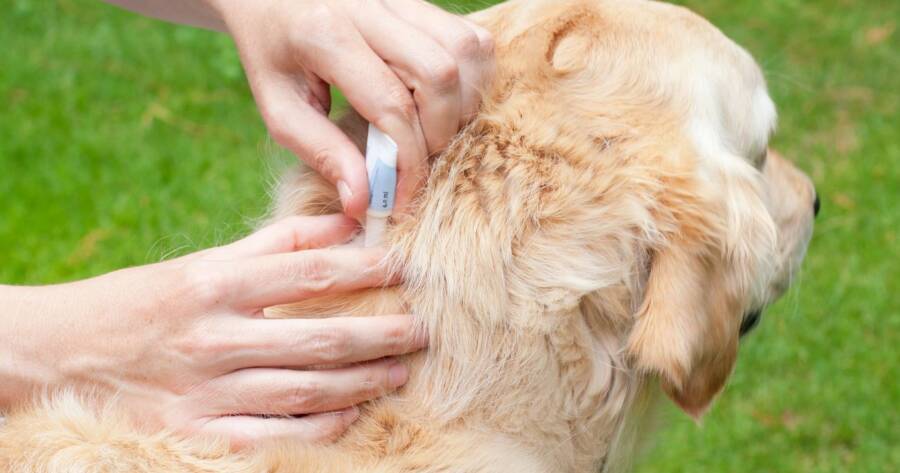Fleas can be irritating for people. They’re not just a minor nuisance, though. The pests can be extremely distressing for your pets.
As they hitch a ride on an animal, fleas bite and suck blood, which can cause inflammation and itching. According to Pets & Parasites, half of all canine and feline skin problems reported to veterinarians stem from flea allergy dermatitis.
Fleas can also carry disease. They can infect cats with Bartonella, the bacteria responsible for cat-scratch disease. These bacteria can be transmitted to humans. Fleas can also serve as a host for tapeworms and pass the parasites to your pets or, more seldom, you.
3 Signs Your Pet Has Fleas
Your animal might feel the flea bite the skin. After a flea has bitten, your pet may develop a small, red welt that looks like a tiny mosquito bite. These bites are itchy, and you might notice your pet scratching frequently.
Because cats and dogs scratch and groom themselves regularly, you might not notice an increase in this behavior at first. If your pet is also restless, licks, or chews at specific areas of the body or shakes its head often, it might have fleas.
Another sign of fleas on your pet is hair loss. Your furry friends might lose patches of fur due to excessive licking and biting. You might even notice scabs or open wounds where your pet has repeatedly licked or nibbled at his skin in an effort to stop the itching.
Finally, an animal with fleas may develop red patches on the skin. Check under the armpits or in the groin area, where there is less fur and the environment is warm and moist. Fleas tend to congregate in these areas, and a pet with fleas may have many red bumps on the skin there.
Why Fleas Drive Your Pet Crazy
An animal with fleas might do more than just scratch all the time. It may exhibit strange behavior, such as rolling around on the floor or running away from an unseen pursuer.
Fleas are fast, and they jump up to 150 times their length. They jump onto hosts, where they can hitch a ride and get a blood meal. After a female feeds, she starts laying eggs. Females can lay up to 50 eggs per day.
Adult fleas can live for about three months without feeding on a host. If you have pets, fleas are likely to find their way to a delicious meal, though.
Fleas may congregate where your pet likes to rest, making it impossible for the animal to relax because of the constant biting. The pests have tiny spines that let them move through the animal’s fur, producing a tingling sensation.
Some animals are allergic to flea bites. If this is the case, your pet may develop a rash or itching beyond the spots where it was bitten. Its entire body may be uncomfortable, and it might develop an infection if the bites turn into open wounds.
Pets that feel itchy all the time may have trouble sleeping. This may lead to strange behavior, such as lethargy, aggression, and agitation.
WebMD says that fleas consume up to 15 times their body weight in blood. If the insects are feeding on your pet repeatedly, the animal may develop anemia, which can make the gums pale, produce a cool body temperature, and make your four-legged-friend listless. This is particularly dangerous for kittens and puppies.
How to Remove Fleas
If you have found even one flea on your pet or in your home, you likely have more. You likely need to remove fleas from your pet, home, and yard.
On Your Pet
To get rid of fleas on your pet, you might want to use a topical solution. A flea bath might kill any fleas that are on your pet at the time of the bath. However, it won’t provide lasting protection. Once-a-month flea treatment lasts longer and may kill fleas at different stages in their life cycles.
A veterinarian might be able to prescribe an oral medication that kills fleas. Prescription treatments may work better than over-the-counter options.
When applying topical treatments to your animals, make sure that you check with your veterinarian and follow instructions. Some products that are designed for dogs are harmful to cats and vice-versa.
Removing Fleas Indoors
Vacuuming your home will manually remove fleas, larvae, and eggs. According to Doctors Foster and Smith, vacuuming can get rid of 50 percent of flea eggs. Make sure that you vacuum thoroughly, and don’t forget to vacuum upholstery, furniture, and your pet’s bedding. Vacuum your car, garage, and any other area in which your pet hangs out. Seal the vacuum bag in plastic and dispose of it in an outdoor garbage can.
Some people choose to treat their home with an insecticide. If you take this course of action, check with a professional exterminator and your veterinarian to ensure that you’re using a product that’s safe for your family.
Removing Fleas Outdoors
Once you have targeted your home and pet, you need to take care of the outdoor environment. Fleas thrive in moist, shady environments. Break up piles of debris, such as grass and leaf clippings, to disrupt the fleas’ habitat. Spray the yard with an insecticide, or treat the environment with nematodes, parasites that kill fleas and their larvae.
Continue to check your home and pet for fleas. Use a flea comb on your pet at least once a day, removing adults and squeezing them between your fingernails to kill them. Wash your linens and your pet’s bedding weekly. Keep vacuuming every few days to stimulate inactive fleas and remove eggs.
If you’re having trouble managing a flea infestation, do some research to learn what other actions you can take, and work with your veterinarian to find out effective and safe ways to deal with the problem.



